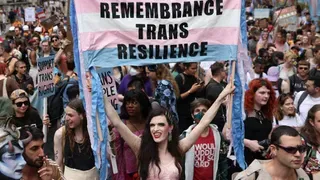February 15, 2014
CDC Updates Term for 'Unprotected Sex'
Kilian Melloy READ TIME: 6 MIN.
In a move praised by HIV/AIDS activists and educators, organizational leadership, and medical researchers, officials at the Centers for Disease Control and Prevention have agreed to stop using the term "unprotected sex" to mean "sex without condoms."
The agency will instead use "condomless sex."
The agreement came in a phone meeting coordinated by the Chicago-based HIV Prevention Justice Alliance, or HIV PJA, and allies on January 23.
For some time now through an open letter, the justice alliance asked the CDC not only to "re-evaluate" its "language," but also its "methods and recommendations regarding the sexuality and HIV prevention strategies of gay, and bisexual men and other MSM," referring to men who have sex with men.
More than 80 organizations nationwide were signatories to the letter.
Sex without condoms is commonly referred to as "barebacking" by men who have sex with men.
During a telephone interview with the Bay Area Reporter , Julie (JD) Davids, director of HIV PJA, called the agreement a "sea change."
"We thank CDC for their definitive commitment to changing language, and we look forward to working with them" to leverage CDC's "leadership role to help community programs, and provide guidance for legal, political, and funding decisions that recognize the current understanding of HIV prevention and risk strategies, which are in part reflected in this change of language."
The significance of the change, she went on to say, is that "conflating sex without condoms" [and "unprotected sex"] is "inaccurate," as well as "a dangerous oversimplification of the practices, challenges, and opportunities of HIV prevention as we know them today as we understand and are learning more and more about the proven efficacy of PEP and PrEP, the uses and implications of undetectable viral load in drastically reducing transmissions, and also the way members of our community choose on their own how to reduce risk."
She was referring to post-exposure prophylaxis (PEP) and pre-exposure prophylaxis (PrEP), which are HIV prevention methods in which people who do not have HIV infection take anti-retroviral treatment soon after an at-risk exposure (PEP) or a daily pill to reduce their risk of becoming infected (PrEP).
"Simply labeling as unprotected is false and doesn't give people the information they need from the public health enterprise about combatting HIV," Davids said.
Davids was referring to risk-reduction strategies employed by gay men, with varying degrees of success, that include serosorting, which means having sex only with partners of the same HIV status, and seropositioning, which means topping only if HIV-negative, bottoming only if HIV-positive.
A CDC spokesman, Scott Bryan, confirmed the changes and said the agency had recent conversations with HIV PJA.
"As discussions about HIV prevention strategies evolve, the terminology needs to evolve as well - an issue the CDC has been aware of and assessing for some time," Bryan said in an email. "In recent conversations with HIV Prevention Justice Alliance, we shared with them our ongoing efforts to align our messages with this changing HIV prevention landscape."
And as activist Sean Strub, author of a new HIV/AIDS memoir, Body Counts, said recently over the telephone, "Quite frankly, having an undetectable viral load possesses a lower risk of HIV transmission than just using condoms."
Strub added, "So while there is a failure rate in condoms that result in HIV transmission, so far no one has even proven sexual transmission of HIV from someone known to have an undetectable viral load at the time of the sexual contact - not a single documented instance."
For his part, Strub lauded HIV PJA's leadership in pressing the CDC.
"It's a welcome and overdo change and example of what we can accomplish when we work together as a community," he said.
Dr. Kenneth Mayer, medical research director and co-chair of the Fenway Institute at Boston's Fenway Health, also hailed the CDC's language change while fleshing out some of the complexities and nuances of risk reduction.
"The decision by the U.S. CDC to change the terminology from 'unprotected sex' to 'condomless sex' is welcomed. 'Unprotected sex' conveys a sense of irresponsibility that may not accurately reflect a person's decision about how to avoid HIV and other STD's," he said, referring to sexually transmitted diseases.
"For example," Mayer said, "someone in a committed monogamous relationship may decide not to use condoms after having been screened for HIV and STDs, and coming to an agreement with a partner about not engaging in intimate relations with others. It would be rare to refer to a heterosexual couple trying to conceive as engaging in 'unprotected sex.'
"Moreover, since the FDA approval of tenofovir-emtricitabine [Truvada] for pre-exposure prophylaxis, individuals who engage in condomless sex may not be completely unprotected," he added.
"Nonetheless, even when people use PrEP, condomless sex may result in other health risks, like STDs, or pregnancy for women. But, by changing the terminology to 'condomless sex,' the behavior may be less stigmatized, and clinicians and behavioral counselors can work with clients to help them use all the tools available to improve their sexual health."
HIV/AIDS activist, educator, and blogger Mark King voiced praise for the CDC's decision in clarifying terminology.
"There are now a multitude of strategies that 'protect' people from HIV infection, and I'm thrilled that the CDC is recognizing that. Their previous definition limiting protected sex to sex with condoms gave a biased view of what's actually happening in the real world," he said, referring to "serosorting, sexual positioning, the precise sex acts involved, PrEP, and successful treatment."
All of them, he said, "qualify as providing various levels of protection [from HIV]. And a couple of them - undetectable viral loads due to successful treatment and the proper use of PrEP - actually provide more protection than condoms."
The CDC's Bryan said that as the number of HIV prevention strategies increases the agency needs to continue to be precise and is being more clear in its language by using terms such as "anal sex without a condom" rather than "unprotected anal sex."
Leadership from local community health organizations also praised HIV PJA and the CDC.
"As a community-based organization fighting the HIV epidemic, we're heartened by both the findings of the MMWR [Morbidity and Mortality Weekly Report] - that gay and bisexual men who know their HIV status have lowered sexual risk - and the CDC's willingness to adjust their language," said Lance Toma, executive director of Asian and Pacific Islanders Wellness Center in San Francisco.
"The national data provided by CDC guides our work, and clarifying language related to sexual risk is critical," he added. "The CDC must continue to partner and work closely with organizations so that we are able to more precisely target our prevention and outreach work. This will support our efforts on the ground to ensure we are all working toward an AIDS free generation."
API Wellness Center was not a signatory to HIV PJA's open letter, said Stephanie Goss, communications manager. "We're commenting as community members affected by this decision, not as campaign leaders or coordinators," she explained.
Meanwhile, Neil Giuliano, chief executive officer of the San Francisco AIDS Foundation, also voiced praise for the change.
"Language is important, and at San Francisco AIDS Foundation we have been saying 'sex without condoms' for years because it more accurately reflects the current HIV prevention landscape," he said. "More than ever before, people have an array of prevention strategies at their disposal that can be used in multiple combinations - from condoms to PrEP, undetectable viral load, serosorting, and seropositioning. In other words, 'protection' now comes in various forms, beyond only using condoms, and we applaud our colleagues at the CDC for updating their language to reflect that reality."
For his part, freelance journalist and HIV/AIDS educator Todd Heywood, based in Michigan, offered his thoughts in light of continued HIV criminal cases.
"There is regularly breathless reporting on how this HIV-positive person, or that one, had unprotected sex. That is presented as evidence of not only intent to transmit the virus, but also implied infectiousness," Heywood said. "The fact is, condomless sex does not, in fact, imply anything other than a person did not use a condom. Rarely does the media, gay or mainstream, take the time to deconstruct the infectiousness of HIV, the role of treatment as prevention or other risk reduction options which do not include condoms," he said.
"The results, as Rea Cary noted in her State of the Movement speech at Creating Change, is the creation of good gays and bad gays, clean gays and dirty gays. It unfortunately creates a false dichotomy of safe and unsafe, which is no longer reflective of HIV knowledge," Heywood added, referring to the National Gay and Lesbian Task Force's annual conference, which took place recently in Houston.
Kilian Melloy serves as EDGE Media Network's Associate Arts Editor and Staff Contributor. His professional memberships include the National Lesbian & Gay Journalists Association, the Boston Online Film Critics Association, The Gay and Lesbian Entertainment Critics Association, and the Boston Theater Critics Association's Elliot Norton Awards Committee.



